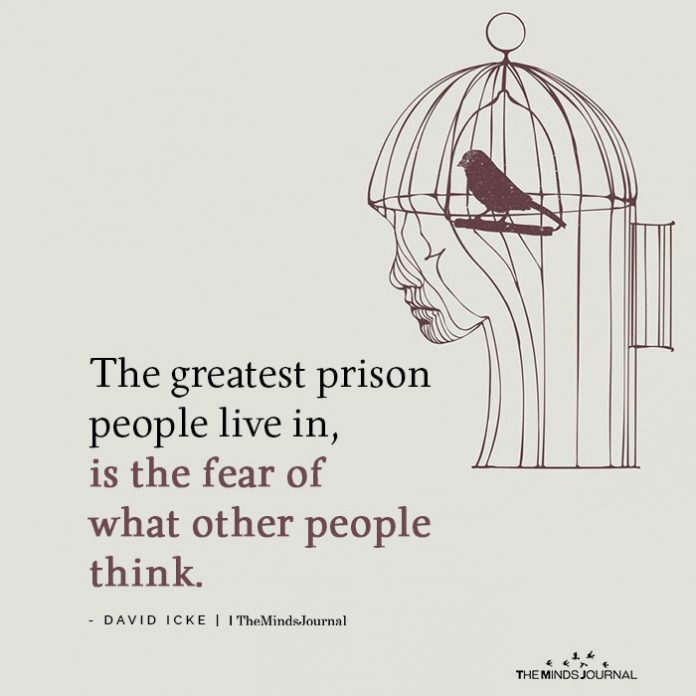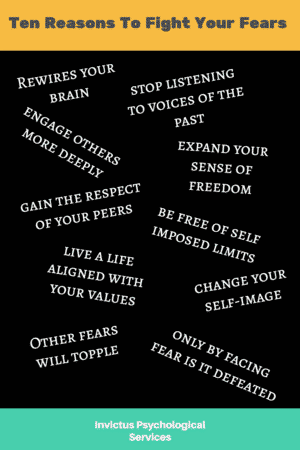In order to truly win in life and live it to the fullest, it is important for you to let go of your anxieties, and work towards conquering your fears.
Fear is a thief. If left unchecked it will rob you of joy, leaving anxious concerns about the future in its stead. By whispering a million reasons not to take action, it steals opportunities that would otherwise make your heart pound with excitement and lead to a life more fully lived.
If not confronted and forced to retreat, fear will eventually introduce you to its cousin, regret. Like an unwelcome hospice worker who insists on remaining nearby until the very end, regret shuffles around the rooms of your life constantly reminding you of what ‘might have been.’
Ralph Waldo Emerson wryly noted that “Fear defeats more people than any other one thing in the world.”
In my clinical practice, it is the most common thing found at the root of people’s problems. Yes, there are many other reasons related to why someone seeks counseling, but almost always fear is somewhere in the mix.
I am not alone in making this observation. Speak to any therapist about this subject and you will hear stories of the pernicious impact that fear extracts. What’s more, this impact is not limited to those who seek counseling. With that in mind, I asked colleagues from across the United States to offer some insights into why it is important to push back against fear.
Let’s look at ten reasons you should put a bullseye on the back of your anxieties.
1. Ben Eckstein
Ben Eckstein is a Licensed Clinical Social Worker in Durham, North Carolina, notes that by facing your fears you begin to change how your brain works.
“When our brain guesses that there might be a danger, it uses anxiety as a way to give us a warning. If we choose to face our anxiety, we demonstrate to our brain that its warning was unnecessary. Our brain then becomes less likely to activate that warning system in similar circumstances in the future.”
2. Karen Koenig
A second reason to face fear, according to therapist Karen Koenig, is that “Our fears are often leftover from childhood and have nothing to do with today. They’re memories of what happened if we tried this or did that, usually based on a handful of dysfunctional people.”
Very likely there are more than enough dysfunctional people trying to influence your life in the present, so it is difficult to see the advantage of having similarly impaired people from your past do the same.
Related: 4 Strategies For Dealing With Fear and Live a Courageous Life
3. Rachel Perlstein
Expanding your sense of freedom is another advantage people gain when confronting anxiety.
Rachel Perlstein, who has a private practice in New York, observes that “People often feel very trapped by their fears and the world can feel very small/limited. When someone takes the steps to face what is scaring them, it can feel like the world gets a bit larger, more open, and carries opportunity. Once they see that the worst-case scenario does not happen or that they can handle a worst-case scenario if it happens, it allows them to engage in the world in a different, more liberated manner.”
4. Lauren Cook
Lauren Cook, from the University of San Diego, has seen how conquering fears can frequently lead to unexpected interpersonal changes.
“Relationships become lighter: When we are fearful, we are constantly in our minds. It’s harder to engage with others because we may be worried about what they think of us or we simply don’t have the mental capacity to connect with them. You’ll find yourself laughing more, being in the moment, and valuing your relationships that much more when you’ve met your fears.”

5. Kim Chronister
Kim Chronister, a psychologist in Beverly Hills, California, encourages her clients to curb and stomp their fears by observing that “Facing your fears results in being more respected by your peers. It is admirable to go for your dreams because there are risks involved which is why many will respect you facing your fears and hopefully you will inspire others.”
6. Victoria Chialy Smith
Not yet convinced? Then consider the following insight from Victoria Chialy Smith (a psychologist in McLean, VA).
Overcoming fears allows you to experience your full potential. “Each of us is filled with infinite potential and capable of reaching it to become the highest version of ourselves. Fear holds us back and limits us, constrains us, and makes us smaller, incapable of seeing our own power and potential. By facing fear, we free ourselves of the limits we place on ourselves.”
Related: Overcome the Fear & Follow your Purpose
7. Carolyn Karoll
When you succeed in breaking free of your fears you are more likely to live life in a way that is aligned with your values.
Carolyn Karoll, a therapist in Towson, Maryland observes that “To walk towards the direction of our values, and having a life with meaning, you must be willing to take risks.” This requires facing the fears that are currently holding you back.
8. Lori Whatley
Your self-image also changes when you take on the forward-leaning mindset necessary for confronting anxiety.
Lori Whatley is a clinical psychologist who recognizes the huge potential for personal growth that comes from facing fear, noting “Our perspective can shift once we overcome fear. We begin to see it differently. With each time we overcome fear, we gain confidence.”
This change in attitude leads to a change in how one looks at life. New opportunities that had gone unnoticed begin to appear more frequently.
9. Jennifer Daffon
The ‘Domino Effect’ is yet another benefit frequently found when one declares war against fear.
According to Jennifer Daffon, a clinical psychologist in Washington state, anxieties connect with one another in a tangled web. This often creates a psychological straight jacket, holding you fast in what seems to be an impossible situation from which to break free.
The key, however, is to realize that when you cut even one chord of that anxiety web, other fears are likely to lose some of their power. She notes that “It is common to see the severity of other worries decrease as the individual overcomes other things on his or her list [of fears].”
Related: 5 Powerful Ways To Help You Overcome Phobias And Irrational Fears
10. Carly Claney
Lastly, it is important to note that unless you pull your shoulders back and intentionally lean in against your fears they will not go away on their own.
Psychologist Carly Claney points out that “When fears go unaddressed, they often diffuse into other areas of struggle.” One fear leads to another and life becomes more and more cluttered with anxiety. Freedom lies on the other side of our fears.
Once we recognize this fact, it becomes clear that we are faced with two choices. We can live haunted by the anxieties that hold us down, or rise to the challenge and fight through the fear.

It is one thing to realize the cost of living with apprehension and dread and quite another thing to take the necessary action to defeat these adversaries of a full and happy life. You must take action. Don’t put it off. Start today.
Long ago Rudyard Kipling noted that “Of all the liars in the world, sometimes the worst are our own fears.”
Don’t spend another moment listening to the lies. Push forward. In your battle against fear go kick down some doors, take no prisoners, and show no mercy to the anxieties that hold you back.
Written By Forrest Talley
Originally Appeared In Forrest Talley
As long as you give into fear, it will keep on crippling you mentally, and emotionally. And it will also stop you from living your best life, and fulfilling your potential. Conquering your fears can seem intimidating at first, but not impossible. Take one step at a time, and focus on dismantling all those fearful and anxious feelings you have, and become truly fearless.










Leave a Reply